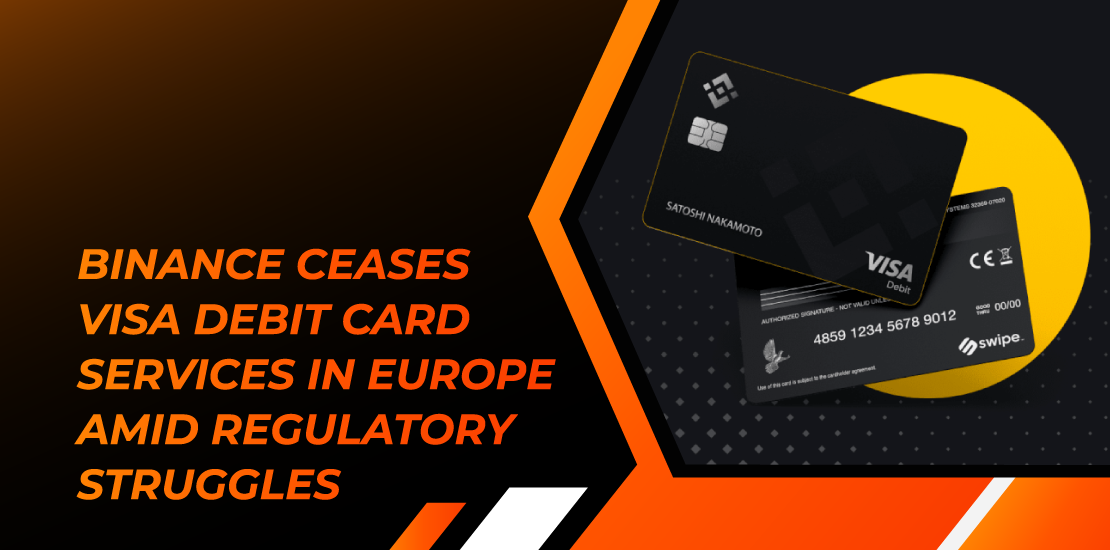- October 25, 2023
- Posted by: [email protected]
- Category:


Binance, the world’s largest cryptocurrency trading platform, is once again making headlines as it announces the discontinuation of its Visa debit card services in the European Economic Area (EEA). This decision, set to take effect on December 20, 2023, marks another setback for the exchange, following Visa and Mastercard’s earlier termination of partnerships with Binance, and is a testament to the ongoing regulatory challenges the platform faces.
Binance informed its users of the upcoming shutdown of its Visa debit card services in the EEA in an official blog post dated October 20. The exchange emphasized that Binance accounts would remain unaffected, and users could continue to use their existing physical or virtual cards as they typically would until the specified date.
The Visa debit card, initially introduced by Binance in the EEA in September 2020, has been a valuable tool for users, allowing them to convert their cryptocurrencies stored on the exchange into local currencies. This enabled the use of digital assets for both online and in-store purchases, empowering European residents to transact with cryptocurrencies at over 60 million global merchants within the EEA. The card even offered cashback bonuses as an added incentive for its users.
The cessation of Binance’s Visa debit card services will also impact the Ukrainian Refugee Crypto Cards program, which caters to verified refugees. While this change presents certain challenges, Binance has reassured its European users that their primary accounts will remain unaffected. However, it’s important to note that transactions via the Binance Pay app may face reduced acceptance compared to Visa cards, which have a vast network of support from 60 million global merchants.
Binance is allowing users to request replacement cards until December 6, and the cashback rewards program will continue, ensuring that users can continue to benefit even after the Visa debit card services are discontinued.
The decision to halt Visa debit card services in the EEA is part of a series of setbacks for Binance stemming from Visa’s termination of their partnership, which was announced in August. Subsequently, in September, Mastercard also terminated its partnership with Binance in various countries, including Argentina, Brazil, Colombia, and Bahrain. These moves from major card providers can be seen within the context of Binance’s ongoing regulatory hurdles.
Binance’s regulatory challenges are not confined to Europe. In the United States, Binance.US suspended U.S. dollar deposits in June and issued warnings about potential withdrawal suspensions. To navigate these challenges, Binance.US partnered with MoonPay to enable U.S. users to purchase Tether (USDT) on the platform. Recently, Binance.US announced that U.S. customers could withdraw dollars from their accounts by converting them into stablecoins.
Binance’s regulatory issues in the United States intensified when the U.S. Securities and Exchange Commission (SEC) filed a lawsuit against Binance and its CEO, Changpeng Zhao, alleging securities rule violations. Earlier in the year, the Commodity Futures Trading Commission (CFTC) also sued Binance for allegedly disregarding rules and providing American users access to the exchange, allegations that Binance has disputed.
As Binance contends with mounting regulatory pressures, it is facing increasing isolation from the traditional financial system. In February, the exchange encountered restrictions with the U.S. banking system and was no longer able to accept certain bank transfers in Australia. Additionally, Binance discontinued its Binance Connect service, which allowed businesses to accept cryptocurrency payments via Visa and Mastercard.
While Binance’s relationship with major card providers has deteriorated, traditional financial institutions, such as PayPal and Visa, are expressing interest in expanding their involvement in the digital currency space. Visa, for instance, has announced the expansion of USDC stablecoin settlement capabilities to Solana and formed partnerships with Worldpay and Nuvei for pilot programs, reflecting a broader trend in the financial industry’s embrace of digital currencies.



